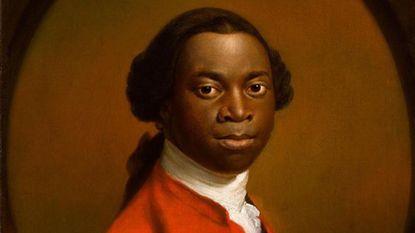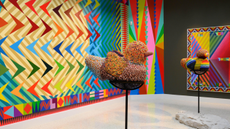Black Atlantic: Power, People, Resistance review
Fitzwilliam Museum exhibition features lives affected by the Atlantic slave trade

In recent years, we have begun to appreciate the extent to which Britain's wealth as a mercantile power was "predicated on the centuries-old rapacious plunder of millions of African people", said Colin Grant in The Guardian. Indeed, "charged traces" of slavery can be found throughout the land: "in fine art and botanical gardens, and in stately homes and museums".
One such is Cambridge's Fitzwilliam Museum, founded in 1816 by Richard Fitzwilliam, whose fortune derived in part from the Atlantic slave trade. The museum's new exhibition is a "bold" attempt to tackle this legacy head-on, gathering together 120 objects with connections to slavery, from collections in Cambridge and beyond, including paintings, sculptures and artefacts. Highlights include "Portrait of an African Man" (c.1525-1530) by Jan Mostaert, thought to be the earliest portrait of a black person in European art, and an "elegant" English 18th century portrait of an unknown man. It's an "innovative" exhibition that explores how "racial enslavement became normalised" in northern Europe. Frans Post's bucolic "A Sugar Mill" (1650), for instance, renders a Dutch slave plantation "idyllic" and "harmonious".
Around 12 million Africans were enslaved by the Atlantic trade, said Tomiwa Owolade in The Times. The exhibition features many fascinating "portals" to the "largely obscure" lives of those affected. You can see the gold weights once used by the Akan people of west Africa to measure their currency; and wooden sculptures illustrating the "customs and cultures" of Caribbean communities. More "striking" still are paintings of various Dutch masters collected by the family of the Fitzwilliam's founders, notably Dirk Valkenburg's "vivid, textured" depiction of enslaved men, women and children at a "ritual slave party" in 18th century Suriname. Unfortunately, however, the show frequently undermines its successes with a "jarring didacticism" over issues of race and empire. As a result, it often feels more like a lecture, and less like an art exhibition.
Subscribe to The Week
Escape your echo chamber. Get the facts behind the news, plus analysis from multiple perspectives.

Sign up for The Week's Free Newsletters
From our morning news briefing to a weekly Good News Newsletter, get the best of The Week delivered directly to your inbox.
From our morning news briefing to a weekly Good News Newsletter, get the best of The Week delivered directly to your inbox.
The show is "impeccably researched" and "well intentioned", said Alastair Sooke in The Daily Telegraph. But you frequently wonder what certain exhibits are doing here. The inclusion of a portrait produced by Rembrandt's studio, depicting a man wearing a breastplate, is justified by the fact that the wooden boards on which it was painted "came from a Dutch colony in Brazil". Elsewhere, a pair of "tortoiseshell tongs" used to "pick up lumps of sugar" makes the cut on account of that commodity's "murderous" connotations.
Slavery was of course "abhorrent", and it is "important to acknowledge past wrongs". Yet exhibitions focusing on the slave trade have almost become a "default mode for our museums and galleries". Consequently, this show is rather less daring, and rather less interesting, than it wants to be.
Fitzwilliam Museum, Cambridge (01223-332900; fitzmuseum.cam.ac.uk). Until 7 January 2024
Create an account with the same email registered to your subscription to unlock access.
Sign up for Today's Best Articles in your inbox
A free daily email with the biggest news stories of the day – and the best features from TheWeek.com
-
 5 high-caliber cartoons about Kristi Noem shooting her puppy
5 high-caliber cartoons about Kristi Noem shooting her puppyCartoons Artists take on the rainbow bridge, a farm upstate, and more
By The Week US Published
-
 The Week Unwrapped: Why is the world running low on blood?
The Week Unwrapped: Why is the world running low on blood?Podcast Scientists believe universal donor blood is within reach – plus, the row over an immersive D-Day simulation, and an Ozempic faux pas
By The Week Staff Published
-
 Rishi Sunak's asylum spat with Ireland explained
Rishi Sunak's asylum spat with Ireland explainedIn Depth Irish government plans to override court ruling that the UK is unsafe for asylum seekers
By The Week UK Published
-
 Properties of the week: houses with enchanting gardens
Properties of the week: houses with enchanting gardensThe Week Recommends Featuring pretty homes in Hampshire, Devon and West Sussex
By The Week UK Published
-
 Venice Biennale 2024: from the good to the bad to the downright 'bizarre'
Venice Biennale 2024: from the good to the bad to the downright 'bizarre'The Week Recommends Central exhibition features the work of some 330 artists
By The Week UK Published
-
 Sunset Song: gripping theatre that's 'close to magic'
Sunset Song: gripping theatre that's 'close to magic'The Week Recommends Morna Young's 'first-class adaptation' of Lewis Grassic Gibbon's classic novel
By The Week UK Published
-
 Challengers: 'the most purely pleasurable film of the year so far'
Challengers: 'the most purely pleasurable film of the year so far'The Week Recommends Zendaya plays a former tennis player turned coach in this 'almost ridiculously' sexy drama
By The Week UK Published
-
 Baby Reindeer: a 'compelling and unforgettable' series
Baby Reindeer: a 'compelling and unforgettable' seriesThe Week Recommends Comedian Richard Gadd's disturbing Netflix drama about stalking
By The Week UK Published
-
 Daniel Wallace's 5 favorite books that should not be forgotten
Daniel Wallace's 5 favorite books that should not be forgottenFeature The author recommends works by Italo Calvino, Evan S. Connell, and more
By The Week US Published
-
 6 picturesque homes in Arizona
6 picturesque homes in ArizonaFeature Featuring a glass elevator in Sedona and a grotto waterfall in Paradise Valley
By The Week Staff Published
-
 Silversea cruise review: a Central and North American adventure
Silversea cruise review: a Central and North American adventureThe Week Recommends An incredible journey featuring cultural exploration, cooking classes, comfort and more
By Yasemen Kaner-White Published